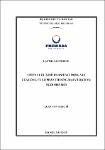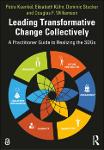Browsing by Subject Kinh doanh
Showing results [1 - 5] / 5
Chiến lược kinh doanh bất động sản của công ty cổ phần thương mại và dịch vụ ngôi nhà mới |
Phân tích thực trạng hoạt động bán hàng. Đánh giá ưu điểm, hạn chế và nguyên nhân trong hoạt động bán hàng. Đề xuất một số giải pháp hoàn thiện hoạt động bán hàng tại Công ty TNHH Thương mại và Xây dựng HTM Việt Nam |
This book directly helps decision-makers and change agents in companies, NGOs, and government bodies become more proficient in transformative, collaborative change in realizing the SDGs. This practitioner’s handbook translates a systemic – and enlivening – approach to collaboration into day-to-day work and management. It connects the emerging practice of multi-stakeholder collaboration to easily understandable models, tools, and cases. Numerous, concrete cases not only bring this methodology to life, but also help identify the challenges and avoid common mistakes. The book can be used as a guide to apply a breakthrough approach for navigating the complexity of stakeholder systems, des... |
The concept of sustainability is important for companies both in the case of SMEs and worldwide multinational companies. Some key factors to help a company achieve its sustainability objectives are based on human resource management. Sustainable human resource management is a typical cross-functional task that becomes increasingly important at the strategic level of a company. Industry 4.0 technologies, Internet of Things, and competitive demands, as signs of globalization, have led to significant changes across the organizational structures and human resource strategies of companies. The increasing importance of sophisticated human resource strategies in the life of companies and the... |
Anything that can be automated, will be. The “magic” that digital technology has brought us — self-driving cars, Bitcoin, high frequency trading, internet of things, social networking, mass surveillance, the 2009 housing bubble — has not been considered ideologically. The Critique of Digital Capitalism identifies how digital technology has captured contemporary society in a reification of capitalist priorities. The theory proposed in this book is the description of how digital capitalism as an ideologically “invisible” framework is realized in technology. Written as a series of articles between 2003 and 2015, it provides a broad critical scope for understanding the inherent demands of... |





